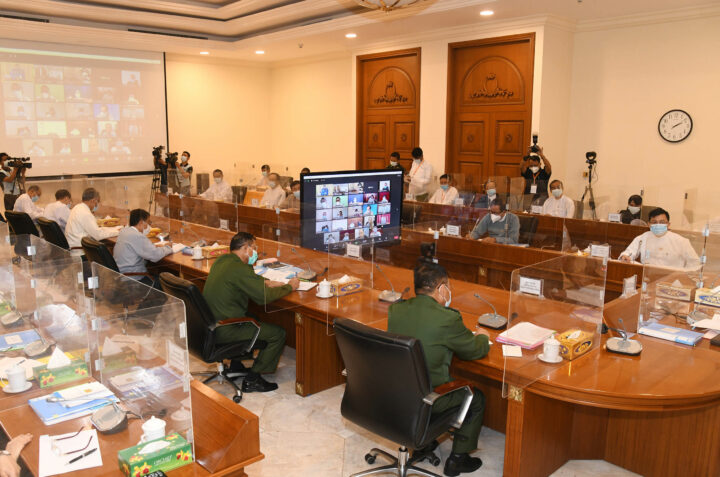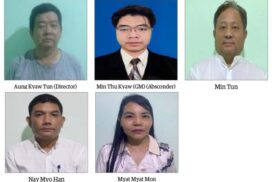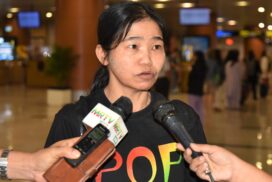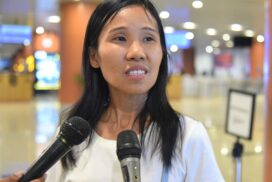The Myanmar national committee on child labour eradication held the fourth coordination meeting as Zoom meeting at the office of the State Administration Council at 2 pm yesterday, with an address delivered by Chairman of the national committee Vice-Chairman of the State Administration Council Deputy Commander-in-Chief of Defence Services Commander-in-Chief (Army) Vice-Senior General Soe Win.
In his address, the Vice-Senior General said eradicating child labour is a global issue of the current era. It is necessary to implement the long term project, which is a big challenge for the country, by accepting it as a national duty. He pledged to forge friendly relations with all countries while inviting foreign investments to develop the economic sector further. Investments will be handled under the existing laws without harming anything.
He stressed the need for respective work committees to hold coordination meetings among them. They must accept it as a national duty as Myanmar’s national action plan on eradicating child labour is to protect the social rights of workers.
According to the 2017 census of the International Labour Organization, a total of 218 million children between the ages of 5 and 17 worked throughout the world, some 152 million — 88 million males and 64 million females of whom were child labour. Among them, about 73 million children worked at dangerous workplaces. The world’s census stated that there were 152 million child workers — 72.1 million in African countries, 62.1 million in Asia-Pacific region countries, 10.7 million in countries of America, 1.2 million in Arab countries and 5.5 million in European and the Middle East countries. In accord with the 2017 report on youth policy of the Republic of the Union of Myanmar, as the number of workable youth across the world reached some 1 billion of the global population, accounting for 18 per cent, the world’s youths face advancement of economic, social and technical affairs, cultural gap and diversities among regional countries and social organizations. As the development role of youths and children are of great importance in shaping the future image of a country, youths and children are invaluable resources of the country.
The majority of regional developing countries employ youths and children who may contribute to productivity as employees. Most of them face challenges related to poverty and employ more child labour at workplaces. Development of State economy, improvement of living standard and promotion of education are directly related to the main factors of employing child labour. Moreover, these main factors are concerned with consequences of global climate change happening in today’s global countries, such as food insufficiency based on storms, flooding, droughts, forest fire and earthquakes and poverty and migration depending on some internal conflicts. Due to socio-economic crises, it is regrettable that child labour, youths and young workers miss the chance to choose learning opportunity for their education. However, they are employed as child labour in the majority of developing countries.
The Vice-Senior General urged region and state administration councils, including Nay Pyi Taw Council, ministries, social partnership organizations, NGOs and INGOs, to steadfastly implement the Myanmar child labour eradication project as a national duty by considering all sectors. The majority of children are working at all sorts of jobs such as house workers, seafood industries, garment and footwear factories so as to provide assistance to families because they are poor and lack learning opportunity.
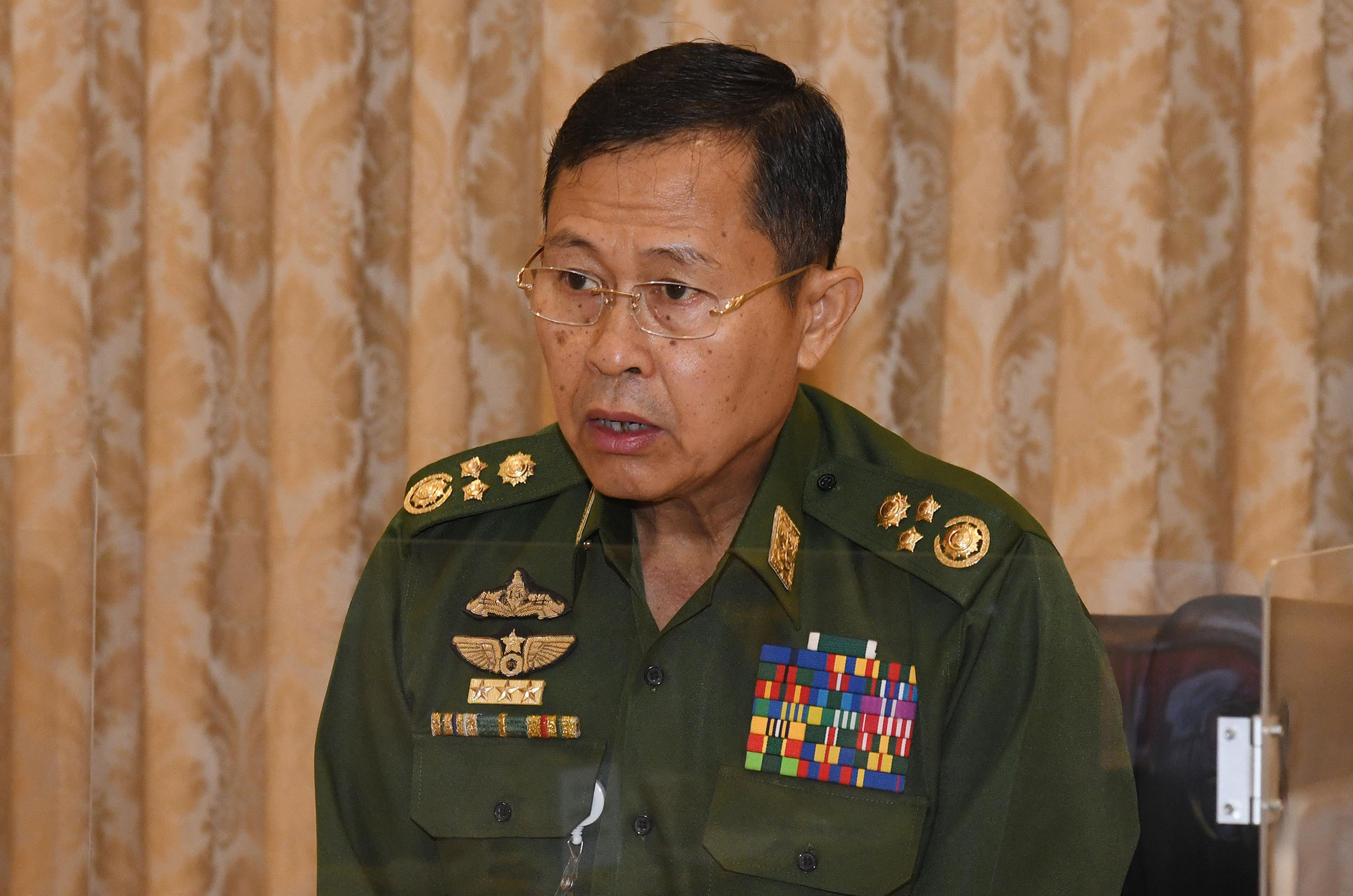
Children are facing pressure to work for earning income without fail. Generally, they are working as child labour in the agriculture, service and industrial sectors. Hence, the national child labour eradication action plan was drawn and implemented to protect the children from workplaces. The Myanmar national committee on child labour eradication was formed with 37 members in 2018, holding three national committee meetings. The Myanmar national child labour eradication action plan was approved. Eight work committees were formed, and each committee is implementing the plan in their respective sectors. The State Administration Council will constitute the national committee with 39 members led by the Vice-Chairman of the State Administration Council with the aim of continuously carrying out eradication of child labour in Myanmar with momentum since its assumption of the State duty.
Being a developing country, Myanmar faces difficulties and criticism of the international community in mitigating the number of child labour as lesser job opportunities and lesser number of family members to earn come for their basic needs is main factors to come out child labour. However, Myanmar applying its capability as much as possible pledged to prioritize solving the issue of child labour effectively. Child labour hits the generalized system of preferences-GPS of big developed countries of the world to some extent, while GPS is an effective aid for the employment opportunity and economic growth of the State. In an effort to reduce child labour, just removal of children from the workplaces is impossible to eradicate child labour. As such, only when it is necessary to create chances for all school-age children to attend the schools free of charge, encourage the strengthening of civil society organizations taking care of children and alleviation of poverty through earning increased income for families, can the underage children be reduced from workplaces.
The Vice-Senior General stressed that today’s meeting needs to approve the work committees of the action plan and adopt the undertakings of work committees and future plans. Region and state administration councils, including Nay Pyi Taw Council, must continuously carry out the action plan and prioritize the tasks to initiate eradication of child labour from their regions by taking education for children, job opportunities, family situation and poverty into consideration in Yangon, Bago and Ayeyawady regions and Mon and Kayin states that will implement the first five-year short-term project. He urged all to seek constructive ways and means for the successful implementation of child labour eradication.
Vice-Chairman of the national committee Union Minister for Labour, Immigration and Population U Myint Kyaing reported on progress in implementation of the action plan, Deputy Minister U Win Shein on undertakings of eradicating child labour and continuous tasks, plans to reconstitute the national committee, eight work committees and secretariat and joint-secretary Director-General U Nyunt Win of Department of Factories & General Labour Laws Inspection detailed tasks of eight work committees.
Those present at the meeting participated in the discussions. The joint secretary reported eight points to be decided in the fourth meeting and sought approval for reconstitution of the meeting minute, work committee and secretary before ending the meeting. —MNA
